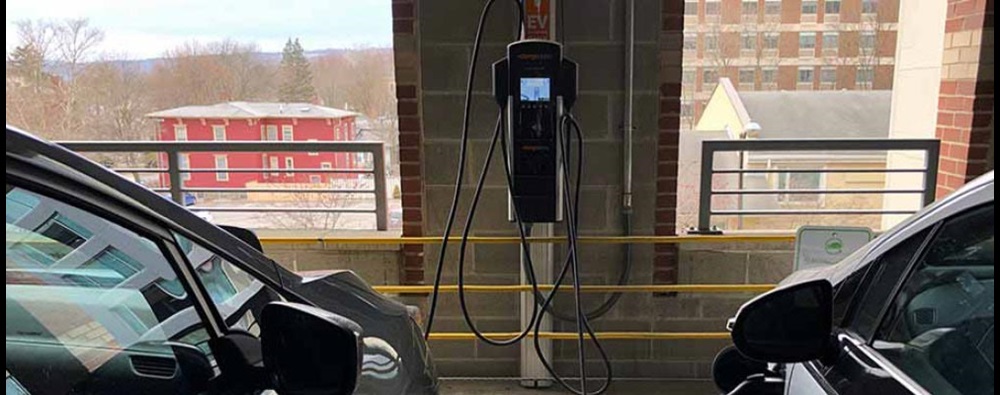
High Impact Action
High Impact Actions
NYSERDA developed a list of high-impact actions that local governments can take to save energy, cut costs, and earn designation. You must successfully complete four actions to become a designated Clean Energy Community and to earn an initial grant.
Each high-impact action is worth points that communities collect upon completion of the action. To receive points for completing high-impact actions, you must submit documentation that verifies all requirements have been met. The points you earn count toward unlocking access to higher designation levels and larger grant funding. Certain high-impact energy actions are eligible for additional Action Grants.
Your regional Clean Energy Community Coordinator will review your goals and help you determine which actions are best for your community and how to access grant funding.
High Impact Actions
Earn points toward grant funding and designation
Benchmarking: Up to 1,800 points
Local governments can adopt a policy that requires annual reporting of energy used in municipal buildings or in large private buildings. Setting up a system for measuring and sharing energy use data helps identify opportunities to cut energy waste and associated costs. View Toolkit
Build Ready: Up to 800 points
The Build-Ready Program advances large-scale renewable energy projects on underutilized land, such as brownfields, landfills, former industrial sites, parking lots, and abandoned or existing commercial and industrial sites. Municipalities can help encourage local participation in the Build Ready Program. View Toolkit.
Renewable Energy: Up to 4,600 points
Municipalities can engage with clean energy technologies by subscribing municipal accounts to clean CDG (e.g., community solar), and/or hosting or installing clean distributed energy resources, such as solar, wind, or hydro on municipal property. View Toolkit.
Clean Energy Upgrades and Municipal Building Demo: Up to 4,100 points
Municipalities can reduce emissions in municipal buildings and act as an example for the community by upgrading existing municipal buildings with energy efficiency technology, building or retrofitting facilities with heat pumps, and/or achieving net zero facilities. View Toolkit.
LED Streetlights: Up to 900 points
Communities can reduce their streetlight energy use by as much as 65% by installing energy-efficient LED lighting, generating cost savings and emission reduction. LED streetlights last longer and are easier to maintain. View Toolkit.
Thermal Energy Networks: Up to 1,000 points
A thermal energy network uses a network of pipes to connect multiple buildings together, often including a large anchor off-taker (e.g., college/university, hospital), and to thermal sources and sinks, such as geothermal, surface water, waste heat, and the air, to provide space heating cooling and domestic hot water. This technology is an effective way for municipalities to reduce greenhouse gas emissions. View Toolkit.
Community Campaigns: Up to 3,800 points
Community Campaigns to promote program opportunities including community solar, electric vehicles, and clean heating and cooling can provide consumers with increased access to clean energy. Action grants are available up to $290K for large municipalities and up to $97.5K for small/medium municipalities. View Toolkit.
County-Hosted Trainings: Up to 1,200 points
The County-Hosted Trainings high-impact action is designed to convene and help communities understand how to manage responsible clean energy development in their communities. View Toolkit.
Energy Code Enforcement Training: 300 points
The Energy Code—a minimum building standard for energy efficiency—is applicable to new construction and renovation of commercial and residential buildings. Completing the training module gives communities opportunities for significant energy savings through improved energy code compliance. View Toolkit.
Climate Smart Communities Certification: Up to 1,400 Points
The certification program provides a framework for local governments to reduce greenhouse gas emissions and build community resilience to climate change. View Toolkit.
Community Choice Aggregation: Up to 2,000 points
Local governments can choose the source of their community’s energy supply while negotiating lower rates and ensuring a greater percentage of electricity comes from renewable sources. View Toolkit.
Green Financing: Up to 1,000 points
Municipalities can establish an Open C-PACE Financing program and/or help promote NY Green Bank financing to enable eligible commercially owned buildings to secure funds for renewable energy upgrades. View Toolkit.
Clean Fleets: Up to 6,700 points
Local governments throughout the State are investing in electric vehicles and infrastructure to reduce greenhouse gas emissions and pollutants. Electric vehicles are more energy efficient and cost significantly less to operate than gasoline- and diesel-powered vehicles. View Toolkit
Electric Landscaping Equipment: 200 points
Landscaping Equipment for municipal operations is a significant contributor to operational GHG emissions, noise, and other pollutants. View Toolkit.
Municipal Clean Fleets Inventory: 200 points
Municipalities have a wide range of vehicles across their fleet, varying from light-duty cars (police cruisers and inspection vehicles) to medium & heavy-duty (box trucks and shuttles). Through this action municipalities can plan their transition to electric vehicles in a thoughtful and efficient manner by starting with an inventory of all fleet vehicles. View Toolkit.
For detailed information on each of these actions, including requirements and recommendations, or to determine which actions are right for you, read the Guidance Document [PDF] or contact your Clean Energy Community Coordinator.
Join Our Email List
Receive the latest Clean Energy Communities news, announcements, and program updates.
Stay Connected
